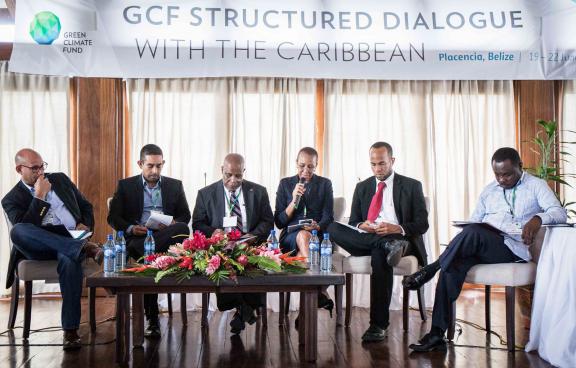Representatives from countries in the Caribbean region are in Belize for a four-day Green Climate Fund (GCF) regional meeting to advance collaboration with the Fund and accelerate access to its resources.
Organized in partnership with the Government of Belize and the Caribbean Community Climate Change Centre (CCCCC), the GCF Structured Dialogue with the Caribbean kicked off on 19 June with a high-level session to put a spotlight on countries’ climate action plans with the Fund.
With several ministers in attendance, participants learned of the challenges facing Caribbean nations as they grapple with the effects of climate change, such as sea-level rise and increased intensity and frequency of extreme weather events. Some of the barriers to an effective response, like limited fiscal space and private sector engagement, were highlighted to underscore the importance of GCF backing in the region.
Speaking at the opening session were Belize’s Minister of State for Sustainable Development and Climate Change, Omar Figueroa; GCF Board Member, Diann Black-Layne; a representative of the National Designated Authority (NDA) of Belize, Yvonne Hyde; and a representative of the GCF Secretariat, Clifford Polycarp.

In her remarks, Ms Black-Layne stressed the importance of the Structured Dialogue in helping countries realize country ownership, which she said “is key to the success of projects and programmes that are implemented.” She encouraged developing countries and GCF Accredited Entities to bring projects and programmes to the Fund’s Board that are designed to implement the Paris Agreement and the United Nations Framework Convention on Climate Change (UNFCCC).
Welcoming participants on behalf of the Government of Belize and its NDA was Yvonne Hyde, who noted GCF’s commitment to support countries in the region in the implementation of the Paris Agreement.
“The Green Climate Fund takes into account the needs of societies that are particularly vulnerable to the adverse effects of climate change in developing countries, including the least developed countries, Small Island Developing States, and African States. As such, this Structured Dialogue presents us with an opportunity to increase our understanding of the modalities and procedures of the Fund,” said Ms Hyde.

In his remarks, Mr Polycarp, the acting director of GCF’s Country Programming Division, spoke to the value of the Structured Dialogue. He underscored that the format provides a unique platform for countries, GCF Accredited Entities and other partners to offer experiences and lessons in engaging with the Fund.
“This sharing and exchange of ideas is a crucial aspect of the regional dialogues. The experiences shared help countries to sometimes rethink or reconfigure their own plans and actions in a way that is highly relevant for them,” he said.

An anticipated outcome of the Dialogue is the development of a regional roadmap for the Caribbean, combined with countries’ individual national plans for the GCF. The high-level focus of the opening day served as an opportune occasion for countries to present their priorities and detail potential projects and programmes that could be submitted to the GCF for funding consideration. This included an interactive panel discussion with ministers and senior government representatives from Barbados, Belize, Grenada, Haiti, Jamaica and St. Vincent and the Grenadines.
Over the remaining days of the Dialogue, countries will expand upon their ideas and, at the same time, increase their understanding of the GCF funding modalities available to them. This includes the GCF Readiness Programme to strengthen institutional capacities and country ownership, and the Private Sector Facility (PSF) to mobilise institutional investors and leverage GCF’s funds to encourage corporates to co-invest.
Harnessing the region’s private sector partners is a priority for countries to scale up investment and unleash technological innovation in areas like renewable energy and energy efficiency.
In support of this, participants were briefed on the GCF’s request for proposals (RFP) to mobilise resources at scale. Through this RFP, the Fund is allocating up to USD 500 million to identify at least three high-impact projects and programmes that mobilise private sector investment in climate change activities.
Joining country delegations at the Dialogue are representatives of the Fund’s Accredited Entities, as well as observer organisations, GCF Board Members, and GCF Secretariat staff. The Structured Dialogue with the Caribbean runs until 22 June.